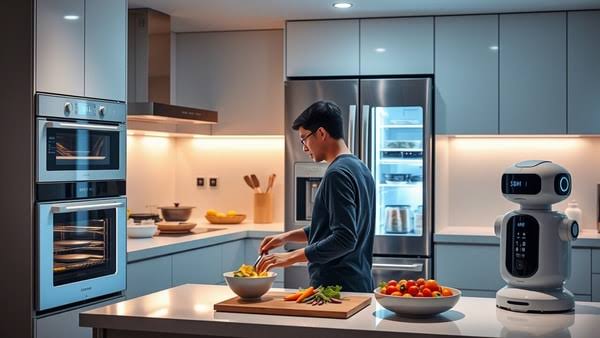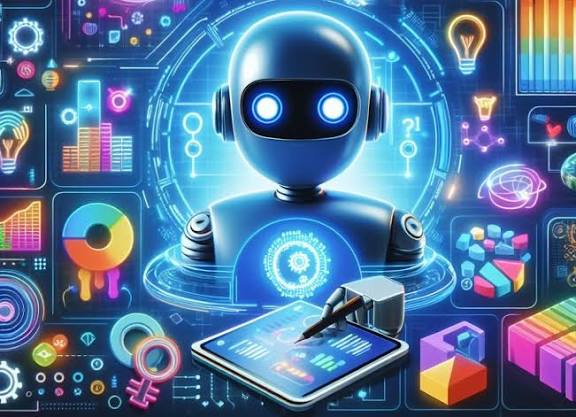
From Cooking to Cleaning: AI Machines That Make Household Tasks Effortless
AI is revolutionizing households by reducing human effort in daily chores. From robotic vacuums to smart ovens, AI-driven machines make cooking, cleaning, and managing homes effortless. These devices optimize resources, enhance security, and provide personalized comfort while saving time.
✨ Raghav Jain

Introduction
Technology has quietly moved into our homes, changing how we cook, clean, and manage everyday life. Gone are the days when household chores consumed hours of energy. Today, AI-powered machines are simplifying tasks like meal preparation, laundry, vacuuming, and even grocery shopping. These smart helpers not only save time but also make our homes safer, cleaner, and more efficient.
While most people think AI is limited to voice assistants or robots, its integration into household appliances is revolutionizing modern living. From smart ovens that cook meals perfectly to vacuum robots that map your floors, AI is turning ordinary homes into intelligent, supportive spaces.
In this article, we’ll explore how AI-powered machines are making household tasks effortless, the science behind their functioning, practical benefits, myths debunked, and tips on using them daily. The modern world is moving faster than ever, and with that pace comes the increasing demand for convenience and efficiency in everyday life. Among the many areas where technology is making life easier, household chores stand out the most. Once considered time-consuming and physically exhausting, cooking, cleaning, and maintaining a home are now being transformed through artificial intelligence (AI). AI-powered machines are stepping into homes across the globe, promising to take the burden of repetitive tasks off our shoulders and give us back valuable time for things that truly matter. From the kitchen to the living room, AI has become a silent yet powerful partner in daily life, reshaping how we view domestic work.
Cooking, for instance, has traditionally required planning, preparation, and close monitoring. But AI-enabled smart appliances are making this process nearly effortless. Smart ovens, for example, can automatically adjust cooking temperatures and times based on the type of food you put inside, even recognizing ingredients with built-in sensors. AI-powered recipe assistants can suggest meal ideas based on what you have in your refrigerator, track nutritional values, and even guide you step by step through voice commands. Smart refrigerators now go beyond keeping food cold; they can remind you of expiration dates, suggest recipes when ingredients are running low, and connect with grocery delivery services to restock your essentials automatically. In this way, AI not only saves time but also helps reduce food waste and promotes healthier eating habits.
In the realm of cleaning, AI-driven machines have become household favorites. Robotic vacuum cleaners are no longer a novelty but a necessity in many homes. These devices use AI to map floor layouts, detect dirt-prone areas, and avoid obstacles while cleaning efficiently. Some even learn your home’s routine and schedule themselves to clean when you are away, ensuring that you return to a spotless space without lifting a finger. More advanced models combine vacuuming with mopping, adjusting water levels and suction based on the type of floor. Beyond floors, AI-enabled window-cleaning robots can scale large glass panels and scrub away dust, while smart dishwashers optimize water and energy usage by recognizing the load size and soil levels on dishes. These developments free up countless hours that people used to spend on manual cleaning tasks, turning them into moments that can be used for relaxation or productivity.
Laundry, another household task that often feels endless, is also seeing the benefits of AI. Washing machines now come with AI programs that can detect fabric types, recommend wash cycles, and automatically adjust detergent levels. Some can even connect to mobile apps to notify you when a cycle is complete or predict maintenance needs before a breakdown occurs. The vision for the future goes even further, with prototypes of AI-powered folding machines that can sort and fold clothes, eliminating one of the most tedious chores in the household.
AI’s role in household management is not limited to individual appliances but extends to entire ecosystems. Smart home systems integrate all these AI-powered devices into a seamless network that can be controlled through a single app or even through voice assistants like Alexa or Google Assistant. Imagine returning home after a long day at work: the AI-powered system can ensure your air conditioner has cooled the house to your preferred temperature, the oven has preheated for dinner, and the robotic vacuum has already tidied up the living room. This kind of coordination creates a home environment that responds intuitively to your needs and lifestyle.
One of the greatest advantages of AI in household tasks is personalization. These machines learn from your habits and preferences over time. For example, a smart coffee machine can remember how strong you like your morning brew and prepare it just the way you want without being told. A robotic cleaner can understand which areas of the home need more frequent cleaning based on your usage. By tailoring their functions to individuals and families, these devices create an experience that feels less like using a machine and more like having a personal assistant at home.
However, as with all advancements, the integration of AI into homes comes with both opportunities and challenges. On the positive side, AI machines reduce stress, save time, and make homes cleaner, healthier, and more efficient. They can also contribute to sustainability by reducing water and electricity consumption through optimized usage. For elderly or physically challenged individuals, AI-powered household devices can significantly improve quality of life, providing independence and comfort without requiring constant assistance from others. On the other hand, concerns about data privacy, security, and over-reliance on machines remain important. Since most of these devices operate through internet connectivity, they are vulnerable to cyber risks. Additionally, while AI makes tasks easier, there is the possibility that future generations may become less skilled at managing household responsibilities manually, creating an overdependence on technology.
Despite these concerns, the momentum of AI in household innovation shows no sign of slowing down. Tech companies are constantly working on making these devices smarter, more energy-efficient, and more affordable. What was once considered futuristic is now becoming mainstream, with AI-driven appliances entering middle-class homes and not just luxury spaces. The vision of a fully automated home—where cooking, cleaning, laundry, and even grocery shopping are handled almost entirely by machines—is closer than ever.
The story of AI in household management is ultimately a story of human ingenuity. It reflects our desire to improve daily living by freeing ourselves from repetitive, time-consuming tasks and focusing on activities that enrich our lives. Whether it is spending more time with family, pursuing hobbies, or simply relaxing, the hours saved by AI machines are opening doors to a more balanced lifestyle. The future home, powered by AI, is not just about convenience—it is about giving people the freedom to live more fully and focus on what truly matters.
In conclusion, from cooking to cleaning, AI machines are revolutionizing the way households operate. They have transformed mundane tasks into seamless, almost invisible processes that save time, energy, and effort. While challenges like privacy and dependency need careful consideration, the benefits of efficiency, personalization, and enhanced quality of life are undeniable. As AI continues to evolve, the home will no longer just be a place of chores and responsibilities but a space where technology works quietly in the background, creating comfort and ease. Household tasks, once a burden, are now becoming effortless, all thanks to the intelligence of machines designed to serve us.
The Rise of AI in Household Tasks
Artificial Intelligence (AI) refers to machines that mimic human decision-making—learning patterns, analyzing data, and improving with experience. When applied to home life, AI appliances:
- Adapt to your habits (e.g., adjusting oven temperature based on past recipes).
- Save time (automatic cleaning or cooking).
- Enhance safety (detect gas leaks or food overcooking).
- Reduce mental load by taking over repetitive tasks.
This shift isn’t just about convenience—it’s about creating smarter lifestyles where humans focus on meaningful tasks while AI handles the mundane.
AI in the Kitchen: Smarter Cooking
1. Smart Ovens and Cookers
AI ovens can identify the food you place inside, adjust temperature, and cook it to perfection without constant checking. Many have cameras that track progress and apps that send alerts to your phone.
- Example: Baking bread that comes out golden without burning.
2. AI-Powered Coffee Makers
These machines remember your preferences—strong, light, with milk, or black—and prepare coffee just the way you like it, every morning.
3. Smart Refrigerators
Equipped with AI and cameras, they track what’s inside, suggest recipes based on ingredients, and even create shopping lists automatically. Some notify you if food is about to expire.
4. Voice-Controlled Cooking Assistants
AI speakers can guide you through recipes step by step while you cook hands-free.
AI in Cleaning: Stress-Free Homes
1. Robot Vacuum Cleaners
These small AI machines map your home layout, detect dirt-heavy areas, and clean systematically. They avoid furniture, pets, and stairs while you relax or work.
2. Smart Mops and Floor Cleaners
Some AI cleaners not only vacuum but also mop floors, adjusting water levels and pressure based on floor type (tiles, wood, carpet).
3. AI Laundry Machines
They detect fabric type, adjust detergent amount, and use the right water temperature. This prevents wear-and-tear while saving energy.
4. Window Cleaning Robots
These AI devices suction onto glass and clean windows automatically, reducing risk and effort.
AI for Home Management
1. Smart Dishwashers
Using sensors, they identify how dirty your dishes are and adjust cycle time, water usage, and energy consumption.
2. Air Purifiers and Climate Control
AI-based air purifiers detect pollutants and adjust filtration speed. Smart thermostats learn your temperature preferences and maintain comfort while saving electricity.
3. AI Security Systems
From smart doorbells with face recognition to AI-powered CCTV cameras, these devices protect homes while you’re away.
Benefits of AI-Powered Household Machines
- Time-Saving
- AI reduces hours spent on chores, freeing time for family, work, or hobbies.
- Energy Efficiency
- Smart machines optimize energy and water usage, lowering bills.
- Consistency & Quality
- Perfectly cooked meals, spotless floors, and clean laundry every time.
- Customization
- AI learns your lifestyle and adapts—whether it’s your favorite coffee or preferred cleaning schedule.
- Reduced Stress
- Automation takes away the constant mental load of “what’s next to do at home.”
Daily Routine with AI Helpers
Morning
- Wake up to freshly brewed coffee from your AI machine.
- Your smart fridge sends a recipe suggestion based on last night’s leftovers.
Afternoon
- Robot vacuum cleans while you work.
- AI air purifier adjusts to keep the indoor air fresh.
Evening
- Dinner is prepared in a smart cooker while you exercise or relax.
- AI washing machine completes laundry with minimal supervision.
Night
- Smart security system activates automatically.
- AI dishwasher cleans after dinner and adjusts settings based on load.
Weekly AI Household Practices
- Run deep cleaning cycles with robot mops and vacuums.
- Review fridge’s suggested grocery list and shop accordingly.
- Test one new recipe guided by your AI cooking assistant.
- Rotate laundry settings to maintain fabric freshness.
- Update security system’s alerts and preferences.
Challenges and Limitations
- High Cost – Many AI-powered appliances are expensive initially.
- Maintenance – Sensors, batteries, and software require updates.
- Dependency – Over-reliance may reduce basic cooking or cleaning skills.
- Privacy Concerns – Smart devices often collect data about your habits.
Myths About AI Household Machines: Busted!
“AI appliances replace humans completely.”
→ False. They assist, but human supervision and decision-making are still vital.
“Smart devices consume more energy.”
→ Actually, they often save energy by adjusting to needs efficiently.
“Only tech-savvy people can use AI machines.”
→ Modern AI devices are designed for simplicity with voice or app controls.
“AI robots always work perfectly.”
→ No. They require updates, cleaning, and occasional manual adjustments.
“It’s just a luxury, not a necessity.”
→ With busy modern lifestyles, AI helps balance work, home, and wellness.
Sample AI Household Integration Plan
Day 1 – Use robot vacuum while at work.
Day 2 – Try cooking a new dish with smart oven guidance.
Day 3 – Run AI washing machine on fabric-care mode.
Day 4 – Experiment with fridge recipe suggestions.
Day 5 – Use AI air purifier for improved sleep.
Day 6 – Plan grocery shopping with fridge + voice assistant.
Day 7 – Relax as smart dishwasher and vacuum reset your home for the week.
Conclusion
The era of AI in household management is here, transforming daily chores into effortless, efficient, and even enjoyable tasks. From cooking and cleaning to home security and energy savings, AI-powered machines bring a balance of comfort, innovation, and peace of mind.
These tools don’t just save time—they improve quality of life. Instead of spending hours scrubbing, cooking, or worrying, you can invest in relationships, work, creativity, and rest.
The future home is not just smart, but caring—a place where machines handle repetitive tasks while humans live fuller lives.
Start small. Add one AI helper. Let it learn your routine. Watch how your daily life transforms into effortless living.
Q&A Section
Q1:- How are AI-powered kitchen appliances changing the way we cook?
Ans :- Smart ovens, AI-based cookers, and recipe-recognition apps adjust temperature, suggest meals, and even guide step-by-step cooking, making meal preparation easier and faster.
Q2:- What role do robotic vacuum cleaners play in modern homes?
Ans :- AI-driven vacuums map rooms, avoid obstacles, and clean autonomously, saving time and effort while maintaining a dust-free environment.
Q3:- How can AI assistants simplify daily household management?
Ans :- Voice-controlled assistants like Alexa and Google Home manage schedules, control appliances, play music, and provide reminders, acting as digital home managers.
Q4:- What benefits do AI washing machines and dryers bring?
Ans :- They sense fabric types, adjust water and detergent levels, and optimize drying cycles, ensuring clothes are cleaned efficiently with less energy and water use.
Q5:- How is AI transforming dishwashing?
Ans :- Smart dishwashers detect how dirty dishes are, adjust water flow, and optimize cleaning cycles, giving spotless results with minimal human input.
Q6:- What is the impact of AI in home security systems?
Ans :- AI-powered cameras and sensors recognize faces, detect unusual movements, and send instant alerts, offering smarter and safer household protection.
Q7:- How does AI help in maintaining smart climate control at home?
Ans :- AI thermostats learn family routines, adjust heating and cooling automatically, and reduce energy bills by optimizing indoor climate.
Q8:- In what ways do AI gardening tools support homeowners?
Ans :- Robotic lawnmowers and AI irrigation systems cut grass, monitor soil moisture, and water plants as needed, simplifying garden maintenance.
Q9:- How can AI help in grocery management?
Ans :- Smart fridges track expiry dates, suggest recipes with available items, and even place online orders when stock runs low.
Q10:- What future innovations can we expect in AI household helpers?
Ans :- Next-gen robots may fold clothes, cook full meals, handle home repairs, and collaborate with other smart devices, making homes nearly self-sufficient.
Similar Articles
Find more relatable content in similar Articles

Top AI Applications for Design..
AI is revolutionizing social .. Read More

The Role of AI Facial Recognit..
AI facial recognition is revo.. Read More

Hyperloop Technology: A Game-..
Hyperloop technology envision.. Read More

How Wearable Devices Detect Hu..
Wearable devices use biosenso.. Read More
Explore Other Categories
Explore many different categories of articles ranging from Gadgets to Security
Smart Devices, Gear & Innovations
Discover in-depth reviews, hands-on experiences, and expert insights on the newest gadgets—from smartphones to smartwatches, headphones, wearables, and everything in between. Stay ahead with the latest in tech gear
Apps That Power Your World
Explore essential mobile and desktop applications across all platforms. From productivity boosters to creative tools, we cover updates, recommendations, and how-tos to make your digital life easier and more efficient.
Tomorrow's Technology, Today's Insights
Dive into the world of emerging technologies, AI breakthroughs, space tech, robotics, and innovations shaping the future. Stay informed on what's next in the evolution of science and technology.
Protecting You in a Digital Age
Learn how to secure your data, protect your privacy, and understand the latest in online threats. We break down complex cybersecurity topics into practical advice for everyday users and professionals alike.
© 2025 Copyrights by rTechnology. All Rights Reserved.